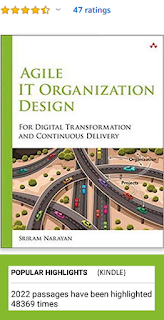Sriram Narayan
Goodreads Author
Website
Twitter
Genre
Member Since
May 2015
URL
https://www.goodreads.com/sriramnarayan
* Note: these are all the books on Goodreads for this author. To add more, click here.
“An organizational norm that says, “We value practice over theory but we value theory-informed practice over ad-hoc practice” helps to restore some respect for theory. We”
― Agile IT Organization Design: For Digital Transformation and Continuous Delivery
― Agile IT Organization Design: For Digital Transformation and Continuous Delivery
“Collaboration across teams tends to be discontinuous and discrete (e.g., via meetings).”
― Agile IT Organization Design: For Digital Transformation and Continuous Delivery
― Agile IT Organization Design: For Digital Transformation and Continuous Delivery
“Instead of a central finance function tracking if funds are utilized as per plan, we have outcome owners accountable for realizing value out of pre-approved funds tied to outcomes rather than plans.”
― Agile IT Organization Design: For Digital Transformation and Continuous Delivery
― Agile IT Organization Design: For Digital Transformation and Continuous Delivery
“Handoffs are mostly a result of specialization. Organization design cannot reduce these handoffs, but it can make them faster and cheaper by making them occur inside a single team.”
― Agile IT Organization Design: For Digital Transformation and Continuous Delivery
― Agile IT Organization Design: For Digital Transformation and Continuous Delivery
“Instead of a central finance function tracking if funds are utilized as per plan, we have outcome owners accountable for realizing value out of pre-approved funds tied to outcomes rather than plans.”
― Agile IT Organization Design: For Digital Transformation and Continuous Delivery
― Agile IT Organization Design: For Digital Transformation and Continuous Delivery
“Micromanagement is mismanagement. … [P]eople micromanage to assuage their anxieties about organizational performance: they feel better if they are continuously directing and controlling the actions of others—at heart, this reveals emotional insecurity on their part. It gives micromanagers the illusion of control (or usefulness). Another motive is lack of trust in the abilities of staff—micromanagers do not believe that their colleagues will successfully complete a task or discharge a responsibility even when they say they will.”108”
― Work Rules!: Insights from Inside Google That Will Transform How You Live and Lead
― Work Rules!: Insights from Inside Google That Will Transform How You Live and Lead
“So what is Adam’s insight? Having workers meet the people they are helping is the greatest motivator, even if they only meet for a few minutes. It imbues one’s work with a significance that transcends careerism or money.”
― Work Rules!: Insights from Inside Google That Will Transform How You Live and Lead
― Work Rules!: Insights from Inside Google That Will Transform How You Live and Lead
“Work is far less meaningful and pleasant than it needs to be because well-intentioned leaders don’t believe, on a primal level, that people are good. Organizations build immense bureaucracies to control their people. These control structures are an admission that people can’t be trusted. Or at best, they suggest that one’s baser nature can be controlled and channeled by some enlightened figure with the wisdom to know what is best.”
― Work Rules!: Insights from Inside Google That Will Transform How You Live and Lead
― Work Rules!: Insights from Inside Google That Will Transform How You Live and Lead















